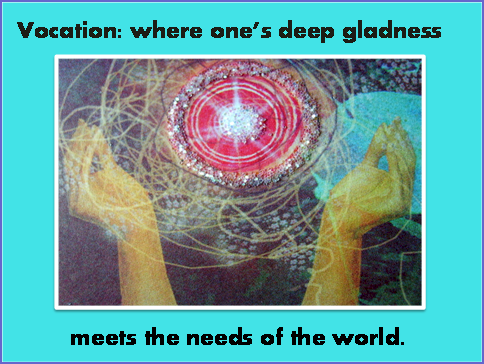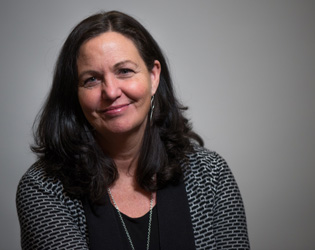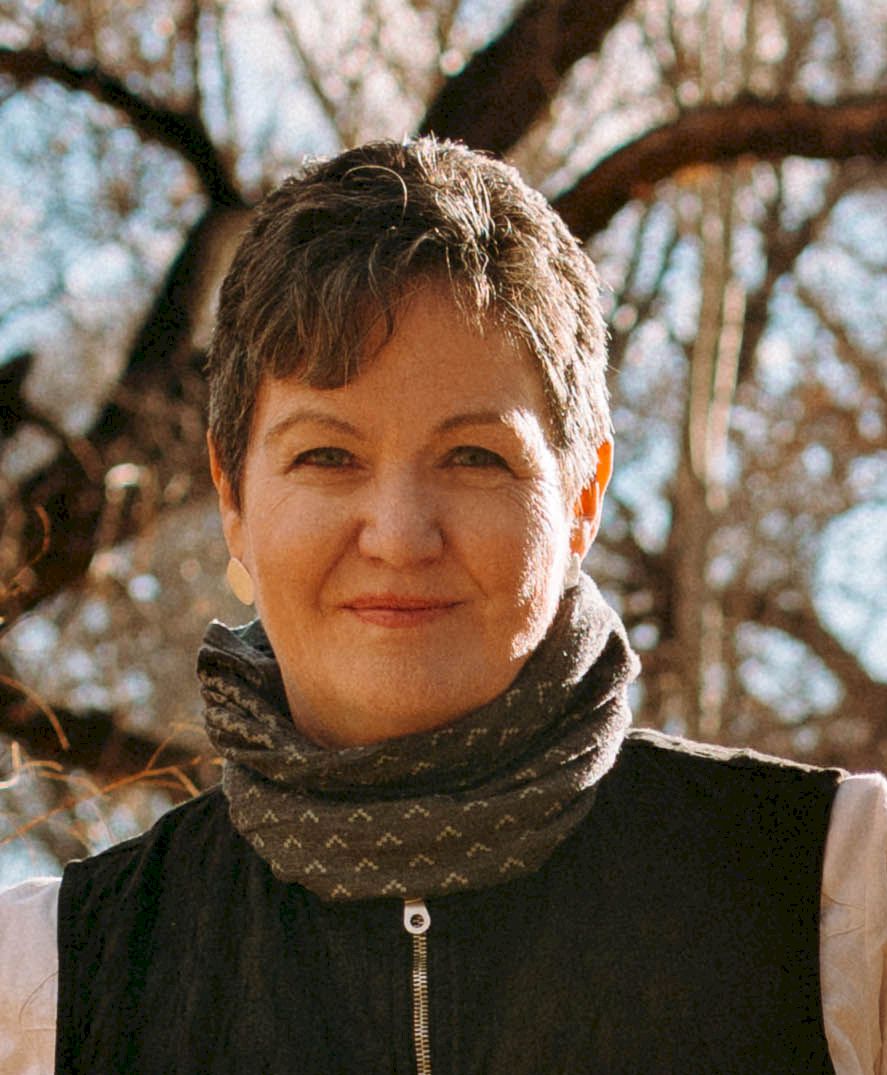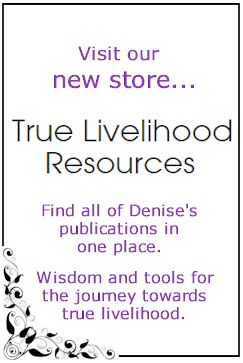15 Core Beliefs at the Heart of Denise's Work
I am excited to share my work-related beliefs which I not only openly espouse to, but enthusiastically champion at every opportunity when speaking about creating opportunity for individuals in the work world! For those who have followed my work, read my books, received my newsletter, or participated in workshops over the years, this list will hold no surprises. In fact, it will probably simply read as Vintage Denise. I hope I am right about that, for what are our efforts worth if they are not readily reflective and expressive of the principles upon which we stand?
Core beliefs relating to people and vocation:
- Everyone is born with gifts. It is impossible to be born to this world without them. In the words of Buckminster Fuller, “Everyone is a genius in the right context.” From that perspective, our greatest challenge is not creating potential in people, but finding or creating the context in which they can express what they have already been given. What constitutes “a gift” is not the impressiveness or depth of skill or talent reflected in a pursuit, but the ease, naturalness and joy reflected in its expression. Thus, what for one may be an uncanny ability to inspire a crowd, for another might be the ability to copy, collate and staple documents, day and in day out, with a sense of pride and satisfaction.
 What we love is what we are here to give the world. In the spirit of Native American belief, it is in the expression of an individual's gifts that they become medicine for the tribe, the family, the community, etc. The health, wholeness and vitality of any community requires the participation of each and every member and the contribution of their gifts, whether expressed through paid employment or through one of the many other wide variety of family, church, social, political, cultural, or artistic contexts. Most people want to make a difference and feel as if they are contributing to something bigger or greater than themselves. Knowing what a person most deeply loves, cares about, and values is vital to finding their right place in the work world.
What we love is what we are here to give the world. In the spirit of Native American belief, it is in the expression of an individual's gifts that they become medicine for the tribe, the family, the community, etc. The health, wholeness and vitality of any community requires the participation of each and every member and the contribution of their gifts, whether expressed through paid employment or through one of the many other wide variety of family, church, social, political, cultural, or artistic contexts. Most people want to make a difference and feel as if they are contributing to something bigger or greater than themselves. Knowing what a person most deeply loves, cares about, and values is vital to finding their right place in the work world.
- There is no such thing as an “unmotivated” person – we are all very motivated to be doing exactly what we are doing. The question to ask is, “In what way(s) is the person's present actions/non-actions serving their purposes?” Whether or not the choices a person is making appear healthy, effective, or in the person's best interests, everything makes sense from the point of reference of the one who is doing it.
- While people may be making choices based in fear, given different circumstances, they would rather base their choices in hope. We are hard-wired to choose security over growth, and while there is no security to be found in the world, it is possible to grow a person’s sense of faith in themselves so that they can handle the consequences that come with taking a risk.
- We often mistake people’s fear of transition for a resistance to change. Most people want to make the changes that would enhance and improve their lives – what they resist are the sacrifices and the challenges necessary to get there. Assisting people to take the journey of change “one step at a time” is key to their eventual success. Most people would benefit more from a coaching model of service than from a counseling model. Teaching people to fish should always take precedence over giving them fish for a day.
- We will never regret treating people as if they were already the person they want to become. People tend to fall or rise to other's expectations of them. By expecting the worst from people, we can expect them to exhibit it. By anticipating and planning for the best from a person, we help them become what they can be!
- Our possibilities are only limited by the range of our own imagination! There are limitless opportunities for everyone in the world, if we but know how to sense them, articulate them, and act on them. Most people do not see or perceive their own possibilities and have a very limited idea of what their choices are in the world! We have all looked in the mirror one too many mornings to be able to see ourselves in the backdrop of our greatest potential. The hardest person in the world to see possibilities for is one’s self.
Core beliefs regarding the nature of business and the world of work:
 We need to expand our thinking and rid ourselves of the illusions that have traditionally shaped the strategies of job seekers and employment professionals. Among them is the illusion of finite rules with regard to how people should enter the world of work; the illusion that if something hasn't happened before, it probably isn’t possible; the illusion that the past is always the most reliable predictor of the future; the illusion that employers will not be open to considering anything which they do not already have in place; and the illusion that the world is done being created and now we just have to learn to live with it as it is! To the contrary, I would suggest that there are endless ways of entering the world of work and making a living, that the very nature of business is to be open and receptive to new markets and new ways of doing things, and that the world is far being finished and, in fact, is alive and vibrant with boundless possibility.
We need to expand our thinking and rid ourselves of the illusions that have traditionally shaped the strategies of job seekers and employment professionals. Among them is the illusion of finite rules with regard to how people should enter the world of work; the illusion that if something hasn't happened before, it probably isn’t possible; the illusion that the past is always the most reliable predictor of the future; the illusion that employers will not be open to considering anything which they do not already have in place; and the illusion that the world is done being created and now we just have to learn to live with it as it is! To the contrary, I would suggest that there are endless ways of entering the world of work and making a living, that the very nature of business is to be open and receptive to new markets and new ways of doing things, and that the world is far being finished and, in fact, is alive and vibrant with boundless possibility.
- A business is a malleable, flexible enterprise that by its very nature will bend and shape itself to be best postured for profit and benefit. There are infinite ways in which we may shape a mutually-beneficial opportunity for a person to employ his/her gifts while simultaneously bringing a benefit or profit to a business. By looking at each individual's skills and abilities as a way of saving money, making money, expanding a customer base, bringing a competitive edge, producing a natural extension, solving a problem, or improving the image of a business, we can expand and create opportunities for both the business and the potential employee.
- We need a healthier, more positive understanding and valuing of the role and interests of those we call “employers”. We need to appreciate and recognize them as individuals who are working hard to achieve their business goals in order to keep their doors open and stay competitive in a difficult and challenging economy. They are our allies, not our adversaries. It is possible, and in fact, paramount, to build partnerships between businesses and social service providers which not only serve their common interests, but bring benefits to both parties which may never have been achieved or envisioned otherwise.
- Resistance in the business community to opening doors to individuals with employment barriers is not so much rooted in outright bias, bigotry or discrimination as it is in fear, discomfort, and unfamiliarity with people from the various populations we represent. Acknowledging, respecting, and finding ways to respond to the concerns that lie at the heart of their resistance is one of the most important roles we have to play. In my experience, nothing has more power to heal and transform negative stereotypes about a group of people than exposure to real individuals from within that group. We need to be creative in developing occasions for individuals to gain exposure with employers be it through company tours, job fairs, informational interviews, work experience, mentorship, job shadowing, apprenticeship or volunteer opportunities.
About the work we do and our approach to it:
- I believe the core purpose of our work is to assist and support people to see beyond their (real or perceived) barriers and limitations in order to enter the more expansive field of their potential and possibility. To that end, we have to embrace the imperative of creativity in helping people recover the capacity to dream, to reclaim the vitality of their imagination, and to exercise healthy judgment in making important choices. The ultimate gift we have to offer is hope and belief on behalf of their future and a broadened perspective from which they can perceive their gifts, their potential, and the overcoming of barriers and limitations.
- We need to expand our understanding of and approach to “career planning” and “career development” both for ourselves and for the individuals we serve. Livelihood is an ongoing journey, with as many twists and turns as the larger journey of life itself. From that perspective there are no “good jobs” or “bad jobs”, there’s just the job we are in and what we are bringing to it and learning from it. There is no failure in the arena of vocation, there’s only feedback.
- The simplest and most profound way of steering our daily course is by remaining steadfast and mindful of the questions that are animating the journey, knowing that they dictate the “quests” we venture upon. We need to ask questions that focus our attention on abundance and opportunity rather than lack and scarcity. We need to ask questions that feed the fires of hope rather than fear, set our sights on the future rather than the past, and deepen our commitment to benefit people rather than a system. The spirit and mindset with we approach our work colors everything we do, everything we see, and everything we ever hope to accomplish.
- We cannot be all things to everyone. There are people who are ripe for what we have to offer and others who are not. We need to focus on those who can benefit from what we have to offer, while not giving up hope that we can be of some assistance to the others. In the words of Mother Theresa, “We should not worry about doing great and noble things, but we should do small things, each day, with great and noble hearts!”
Also See: About Denise: Overview and More about Denise: Q&A


